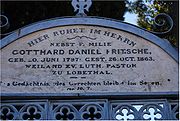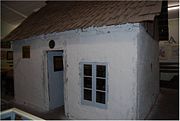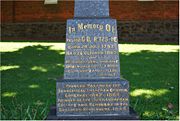
Gotthard Fritzsche
Encyclopedia

Lutheranism
Lutheranism is a major branch of Western Christianity that identifies with the theology of Martin Luther, a German reformer. Luther's efforts to reform the theology and practice of the church launched the Protestant Reformation...
to emigrate
Emigrate
Emigrate is a heavy metal band based in New York, led by Richard Z. Kruspe, the lead guitarist of the German band Rammstein.-History:Kruspe started the band in 2005, when Rammstein decided to take a year off from touring and recording...
to Australia
Australia
Australia , officially the Commonwealth of Australia, is a country in the Southern Hemisphere comprising the mainland of the Australian continent, the island of Tasmania, and numerous smaller islands in the Indian and Pacific Oceans. It is the world's sixth-largest country by total area...
. He was born in Liebenwerda
Bad Liebenwerda
Bad Liebenwerda is a spa town in the Elbe-Elster district, in southwestern Brandenburg, Germany. It is situated on the river Schwarze Elster, 57 km northwest of Dresden, and 28 km east of Torgau.- History :...
, Germany
Germany
Germany , officially the Federal Republic of Germany , is a federal parliamentary republic in Europe. The country consists of 16 states while the capital and largest city is Berlin. Germany covers an area of 357,021 km2 and has a largely temperate seasonal climate...
, and migrated to Australia in 1841. From 1842-1863, he was pastor of the Evangelical Lutheran Church. He died and was buried at Lobethal, South Australia
Lobethal, South Australia
Lobethal is a town in the Adelaide Hills area of South Australia. It is located in the Adelaide Hills Council local government area, and is nestled on the banks of a creek between the hills and up the sides of the valley. It was once the centre of the Adelaide Hills wool processing industry, which...
.
Training and Early Ministry
Gotthard Fritzsche went to Breslau after his gymnasiumGymnasium (school)
A gymnasium is a type of school providing secondary education in some parts of Europe, comparable to English grammar schools or sixth form colleges and U.S. college preparatory high schools. The word γυμνάσιον was used in Ancient Greece, meaning a locality for both physical and intellectual...
training, to receive his university training. There he studied under Johann Gottfried Scheibel
Johann Gottfried Scheibel
Johann Gottfried Scheibel was a Lutheran leader.-Education and Ministry:Johann Scheibel was born in Breslau, Silesia, and studied at the University of Halle from 1801 to 1804. He went on from there to be the assistant minister at St Elisabeth's church in Breslau from 1804 to 1818...
. As was customary, after his university education, he served as a private tutor. At his first examination for entering the ministry, he declared himself to be against the Prussian Union
Prussian Union (Evangelical Christian Church)
The Prussian Union was the merger of the Lutheran Church and the Reformed Church in Prussia, by a series of decrees – among them the Unionsurkunde – by King Frederick William III...
, and was banned from ministry in the State church. He joined the underground Old Lutheran
Old Lutherans
Old Lutherans refers to those German Lutherans who refused to join the Prussian Union in the 1830s and 1840s.Attempted suppression of the Old Lutherans led many to immigrate to Australia and the United States, resulting in the creation of significant Lutheran denominations in those countries.The...
church as a Flying Pastor, who travelled from place to place disguised as a travelling tradesman, and performing secret worship services and rites to those opposed to the State church. After a time, he grew weary of the work, and he travelled to Hamburg
Hamburg
-History:The first historic name for the city was, according to Claudius Ptolemy's reports, Treva.But the city takes its modern name, Hamburg, from the first permanent building on the site, a castle whose construction was ordered by the Emperor Charlemagne in AD 808...
.
Immigration to Australia
Fritzsche arrived in Hamburg at a time when a group of Prussian Old LutheransOld Lutherans
Old Lutherans refers to those German Lutherans who refused to join the Prussian Union in the 1830s and 1840s.Attempted suppression of the Old Lutherans led many to immigrate to Australia and the United States, resulting in the creation of significant Lutheran denominations in those countries.The...
were searching for financing and a pastor to join their group in emigrating to South Australia
South Australia
South Australia is a state of Australia in the southern central part of the country. It covers some of the most arid parts of the continent; with a total land area of , it is the fourth largest of Australia's six states and two territories.South Australia shares borders with all of the mainland...
. In 1840, at the synodical gathering of the newly constituted Lutheran Church in Australia, a request had been sent to the Old Lutherans in Prussia to send a second Pastor, to the young German settlement. A requirement had been imposed on them by the Prussian
Kingdom of Prussia
The Kingdom of Prussia was a German kingdom from 1701 to 1918. Until the defeat of Germany in World War I, it comprised almost two-thirds of the area of the German Empire...
government, that they must be accompanied by a pastor before emigration would be permitted.
Gotthard Fritzsche was not of the mind to emigrate. He had already declined an invitation by Johannes Grabau
Johannes Andreas August Grabau
Johannes Andreas August Grabau was an influential German-American Old Lutheran pastor and theologian. He is usually mentioned as J.A.A. Grabau....
to emigrate to the United States
United States
The United States of America is a federal constitutional republic comprising fifty states and a federal district...
. However, he did relent to the requests of the people who were waiting to emigrate to South Australia. Fritzsche traveled to meet with George Angas
George Fife Angas
George Fife Angas was an English businessman and banker who, from England, played a significant part in the formation and establishment of the Colony of South Australia. He established the South Australian Company and was its founding chairman of the board of directors...
of the South Australia Company
South Australia Company
The South Australian Company was formed in London on 9 October 1835 by George Fife Angas and other wealthy British merchants to develop a new settlement in South Australia; its purpose was to build a new colony...
in England
England
England is a country that is part of the United Kingdom. It shares land borders with Scotland to the north and Wales to the west; the Irish Sea is to the north west, the Celtic Sea to the south west, with the North Sea to the east and the English Channel to the south separating it from continental...
. His purpose was to attempt to gain financing for the balance of the fares, a sum of over £2000. Angas was unable to provide any financing to the group. Fritzsche returned to Hamburg with no financial assistance at all. It was in early June that a letter was received from a "Mrs. Richardson in Newcastle
Newcastle upon Tyne
Newcastle upon Tyne is a city and metropolitan borough of Tyne and Wear, in North East England. Historically a part of Northumberland, it is situated on the north bank of the River Tyne...
UK", with a sum of £270. The remainder of the required finances £1800 was donated by one of the other emigrants, Mrs Anna (Hannchen) Nehrlich. Fritzsche had engaged her daughter Johanna Dorothea (Dorchen, Dorette), while in Hamburg.
The group set sail for Australia, on 11 July 1841 on the ship Skjold
Skjold (ship)
The Skjold was a Danish three mast Barque, built in Sundeborg 1839, and weighing 460 tons. It was owned by C. Petersen, Sundeborg.-Voyages:...
, arriving on 28 October 1841 at Port Misery, South Australia. The migrants settled at Lobethal
Lobethal, South Australia
Lobethal is a town in the Adelaide Hills area of South Australia. It is located in the Adelaide Hills Council local government area, and is nestled on the banks of a creek between the hills and up the sides of the valley. It was once the centre of the Adelaide Hills wool processing industry, which...
, and Bethanien
Bethany, South Australia
Bethany is a small village located about 2 km south east of Tanunda in the Barossa Valley. It was originally named Bethanien, but was changed during World War I in an attempt to remove all German place names from Australia....
. Fritzsche made his home at Lobethal.
Settlement in South Australia

German settlement in Australia
German settlement in Australia began in large numbers in 1838, with the arrival of immigrants from Prussia to Adelaide, South Australia. German immigrants became prominent in settling South Australia and Queensland...
. Relations with the earlier Prussian settlers was initially quite harmonious, however this was to change. In 1842 Pastor August Kavel
August Kavel
August Ludwig Christian Kavel . Pastor Kavel was a founder of Lutheranism in Australia.-Training and Early Ministry:Kavel was born in Berlin, Germany 1798...
, in an attempt to consolidate the settlers into one localized community, strongly urged the settlers in the early settlements at Klemzig
Klemzig, South Australia
Klemzig is a suburb of Adelaide in the City of Port Adelaide Enfield. It is the location of the first settlement of German emigrants to Australia in the 19th century and is named after a village near the city of Zuellichau in southeastern Brandenburg in the German state of Prussia, where they...
and Hahndorf
Hahndorf, South Australia
Hahndorf is a small town about 30 minutes drive out of Adelaide, South Australia along the South Eastern Freeway . The town was settled by Lutheran migrants largely from in and around a small village then named "Kay" in Prussia, many of whom were aboard the Zebra...
to relocate to the newly settled Langmeil
Tanunda, South Australia
Tanunda is a town situated in the Barossa Valley region of South Australia, 70 kilometres north east of the state capital, Adelaide. The town derives its name from an Aboriginal word meaning water hole. Town population is approximately 3500.-Settlement:...
. Many of the settlers in these towns refused, and an underlying tension arose between these communities and Pastor Kavel.
Division in the Church
Over time, Gotthard Fritzsche learned that Pastor Kavel had developed a millennialisticMillennialism
Millennialism , or chiliasm in Greek, is a belief held by some Christian denominations that there will be a Golden Age or Paradise on Earth in which "Christ will reign" for 1000 years prior to the final judgment and future eternal state...
point of view (a point of view which he disagreed with), and had the subject discussed at the synod
Synod
A synod historically is a council of a church, usually convened to decide an issue of doctrine, administration or application. In modern usage, the word often refers to the governing body of a particular church, whether its members are meeting or not...
gatherings in 1844 and 1845. No resolution was reached at either of these gatherings. In addition to this disagreement, Fritzsche also differed with Pastor Kavel, in a proclamation released in 1846, regarding the power of civil government in the church. These disagreements between the two pastors intensified a division which had developed in the Lutheran community.

Bethany, South Australia
Bethany is a small village located about 2 km south east of Tanunda in the Barossa Valley. It was originally named Bethanien, but was changed during World War I in an attempt to remove all German place names from Australia....
, on 16 and 17 August 1846, the subject of millennialism was once again tabled, and when the disagreement became heated, a divide was forged, when the Kavel followers left and formed their own separate synod. At this point, Gotthard Fritzsche became the head of the Evangelical Church of South Australia
History of the Lutheran Church of Australia
The history of the Lutheran Church of Australia is the sequence of events related to divisions, mergers and affiliations of Lutheran church organisations from the time Lutheranism first arrived in Australia, to the time of unification of the two main synods in 1966.-First Lutheran Body in Australia...
.

